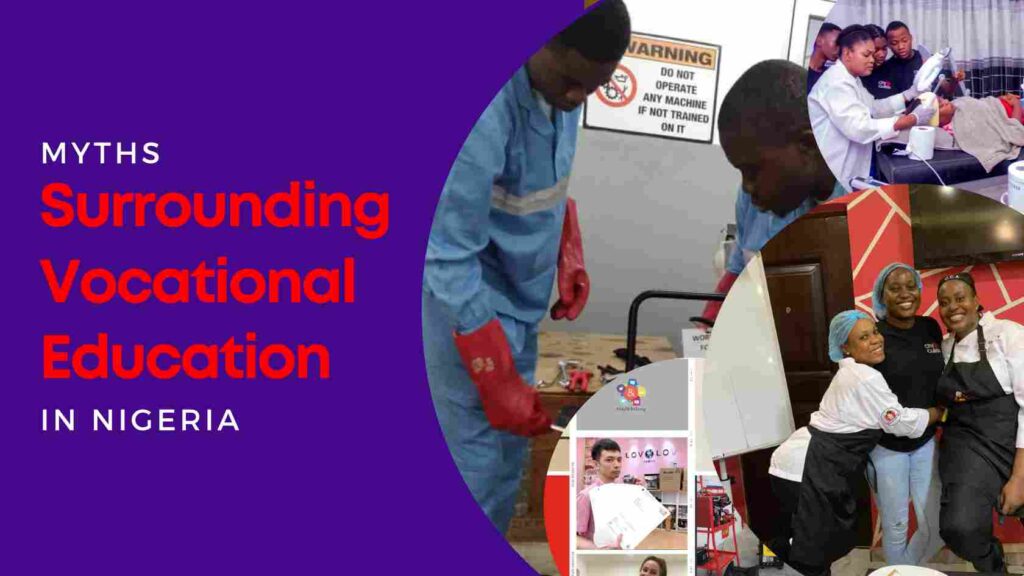Unmasking Misunderstandings: Myths Surrounding Vocational Education in Nigeria

Education is an undeniable cornerstone of progress, and vocational education stands as a transformative force within this realm. Yet, despite its immense value, vocational education often faces misconceptions and underestimation. In Nigeria, this pathway is frequently relegated to a lesser tier, deemed solely for those who struggle in traditional academic settings. However, this perception is not only inaccurate but also detrimental to the nation’s overall growth and development.
This blog aims to dispel these prevailing myths surrounding vocational education in Nigeria, shedding light on its true essence and highlighting its pivotal role in shaping the country’s future. Embark on this journey as we unveil the transformative power of vocational education, empowering individuals and propelling Nigeria towards a brighter horizon.
Myth 1: Vocational Education is Only for People Who Can't Excel in Academics
The idea that vocational education is solely for individuals who struggle in traditional academic settings is a common misconception. In reality, vocational education caters to a diverse range of people with varied strengths and interests. It’s not just an alternative for those who may not excel academically; rather, it’s a pathway for individuals who have a knack for practical skills and hands-on learning.
Many successful professionals in different fields, including engineering, healthcare, culinary arts, and technology, have attained their skills through vocational education. They found this avenue more suitable for their learning style and career aspirations.
This myth often overlooks the fact that vocational education offers valuable hands-on experiences, practical skills, and industry-specific knowledge. It’s a promising path for those who prefer practical learning environments or have a passion for specific trades.
Stay tuned as we uncover more myths and reveal the truth behind vocational education in Nigeria.
Myth 2: Vocational Courses Offer Limited Career Opportunities
Contrary to popular belief, vocational courses provide extensive and diverse career opportunities across various industries. These courses are tailored to meet the demands of today’s job market – offering specialized skills that are highly sought after by employers worldwide.
In the world today, there is a shortage of skilled workers. According to the World Economic Forum, by 2030, there will be a global shortage of 85.2 million skilled workers. This shortage is being driven by a number of factors, including the ageing population, the rise of automation, and the increasing demand for skilled workers in emerging economies.
Vocational education isn’t restricted to a single career track. Graduates can explore numerous professions, from becoming certified electricians, plumbers, or welders to pursuing careers in Information Technology, healthcare, and hospitality.
Moreover, vocational courses offer international recognition. Programs from reputable vocational institutes like City and Guilds of London are globally recognized. They equip students with skills that are valued in international job markets, opening doors to career opportunities abroad.
Additionally, vocational education emphasizes practical, hands-on training, allowing students to gain real-world experience while learning. This experiential learning approach is highly appreciated by employers, giving vocational graduates a competitive edge.
Through collaborations with international vocational institutes like City and Guilds of London, UK, students receive training aligned with global industry standards, enhancing their employability worldwide.
Myth 3: Vocational Courses are Inferior to Academic Degrees
This myth often stems from a misconception that vocational education holds less prestige compared to traditional academic paths. However, the reality is quite the opposite.
Vocational courses hold equal value to academic degrees. They offer specialized training that directly addresses industry needs, providing skills that are immediately applicable in the workforce.
While academic education focuses on theoretical knowledge, vocational education emphasizes practical skills, preparing students for real-world scenarios. This hands-on approach complements academic learning, ensuring a well-rounded education that equips individuals for success in their chosen fields.
Vocational courses effectively bridge the gap between academic knowledge and the specific practical skills required by industries. By focusing on job-specific skills, vocational education ensures that graduates are job-ready and prepared to make immediate contributions to their chosen fields.
Myth 4: Vocational Education Leads Only to Manual Labor Jobs
Here is another contrary to popular belief, vocational education does not exclusively prepare individuals for blue-collar jobs. While it does offer training in technical and practical skills, it encompasses a wide array of career paths far beyond traditional trades:
- Vocational education opens doors to diverse professions beyond manual labour, encompassing fields such as healthcare, beauty therapy, technology, business management, and more.
- With advancements in technology, vocational courses are now integrating digital skills, preparing students for careers in IT, data analysis, website development, and other technology-driven fields.
- Vocational courses nurture entrepreneurship by providing practical skills required to start businesses, manage projects, and develop innovative solutions.
Completing vocational courses does not restrict individuals from pursuing higher education. Many vocational qualifications are equivalent to traditional degrees, allowing progression to higher levels of education.
The Bottom Line
In today’s job market, vocational education is a vital pathway to success. It offers a wide range of career opportunities, provides specialised training that meets the demands of employers and imparts valuable skills that are highly relevant to the workplace. “We have been in existence for over 20 years and have trained over 20,000 students. Our alumni hold positions as managers, entrepreneurs, and professionals both locally and internationally.” Engr. Martin Adeleke, Managing Director of MOA Professional Institute Said.
Vocational education is not just for those who struggle in traditional academic settings; it is a pathway for individuals who have a knack for practical skills and hands-on learning. It is a pathway that can lead to rewarding careers and a bright future.



